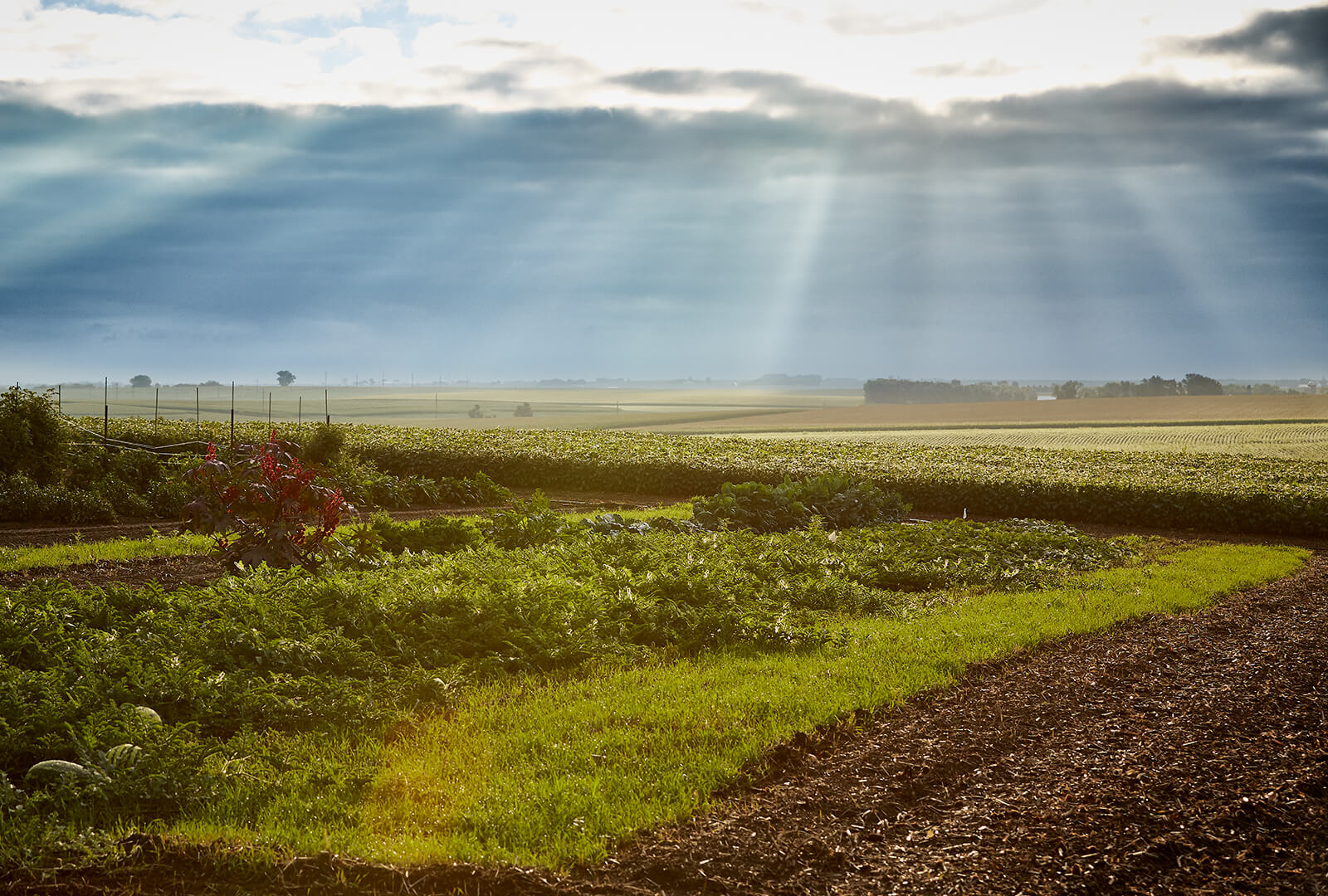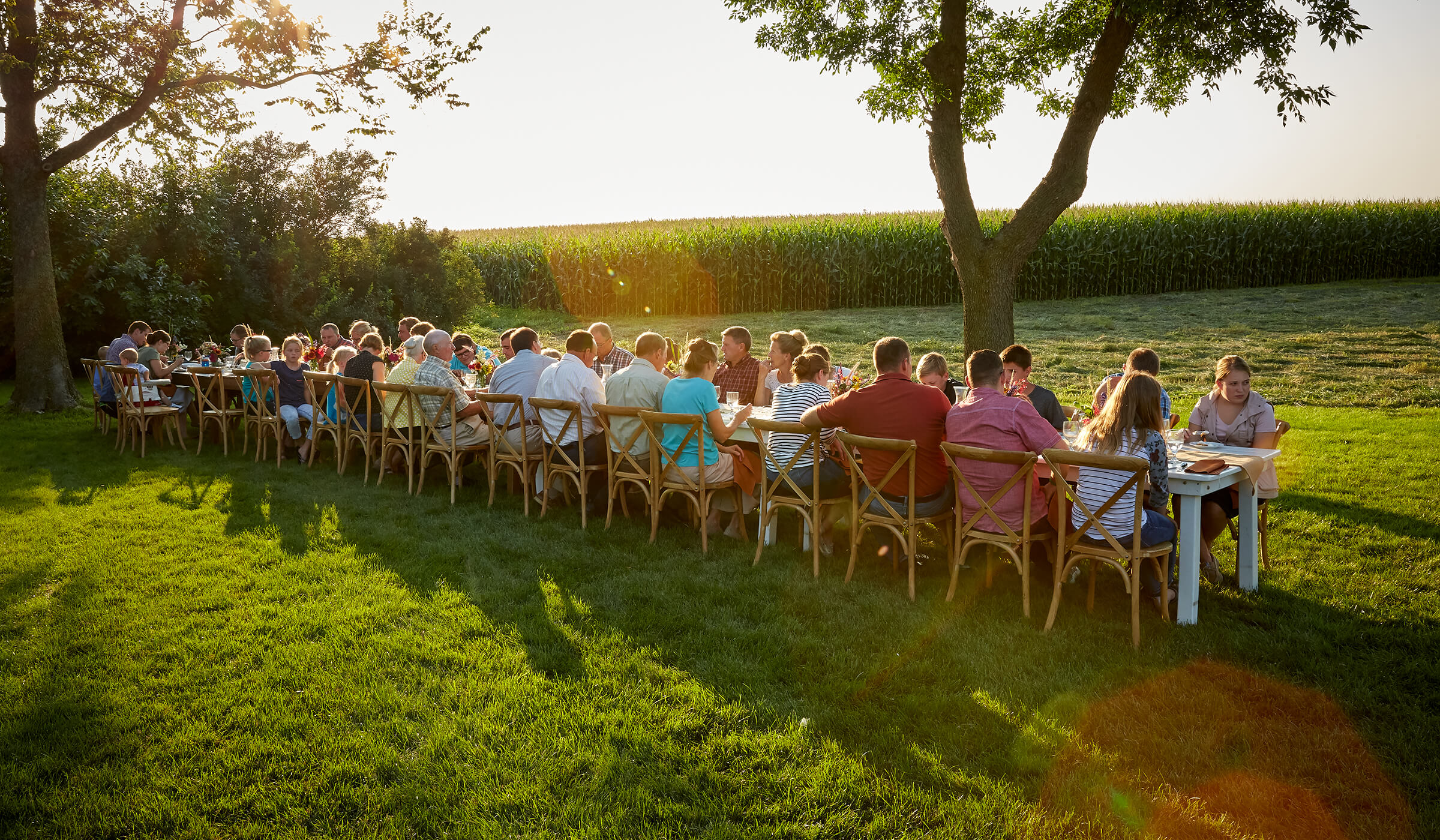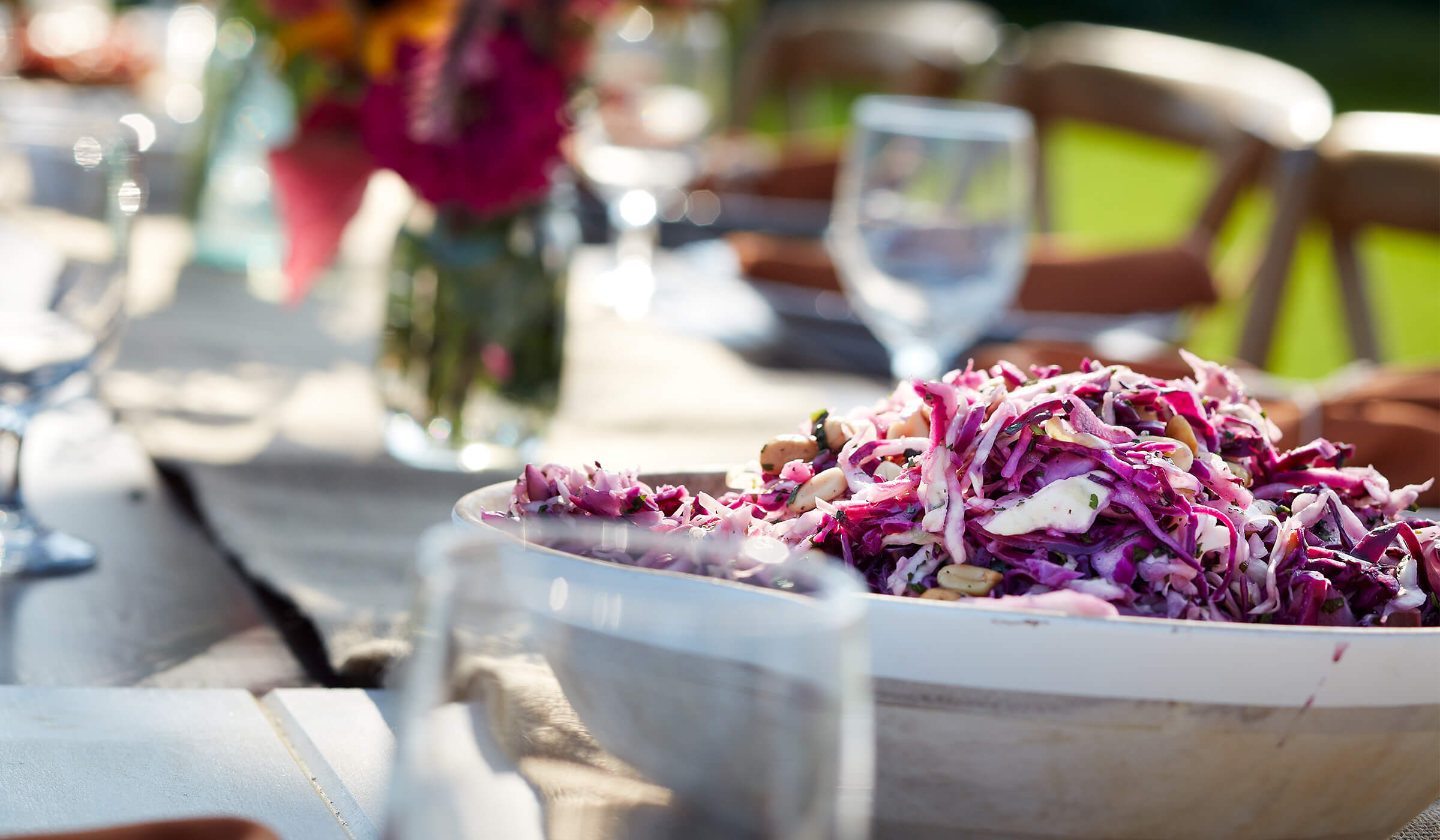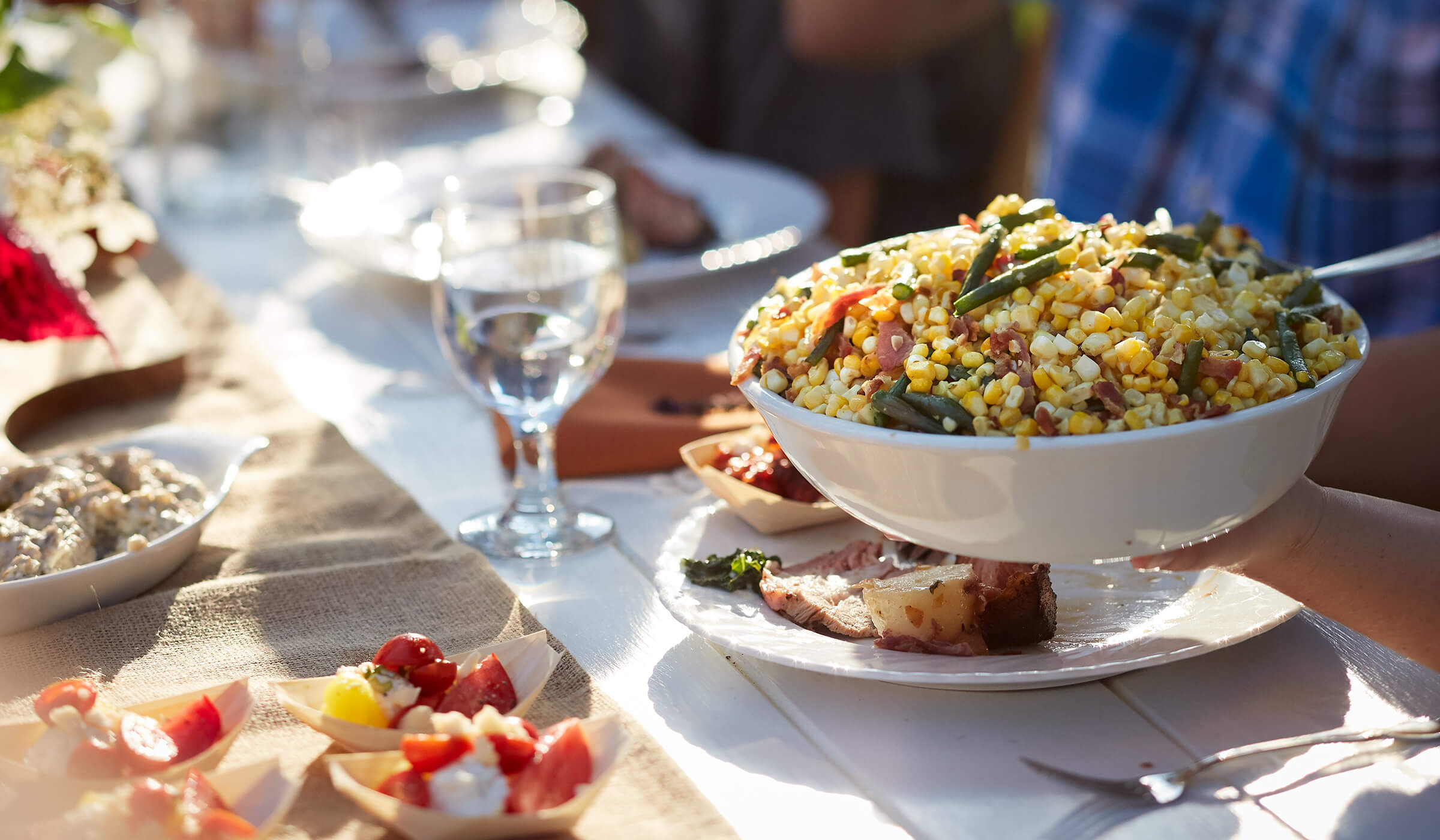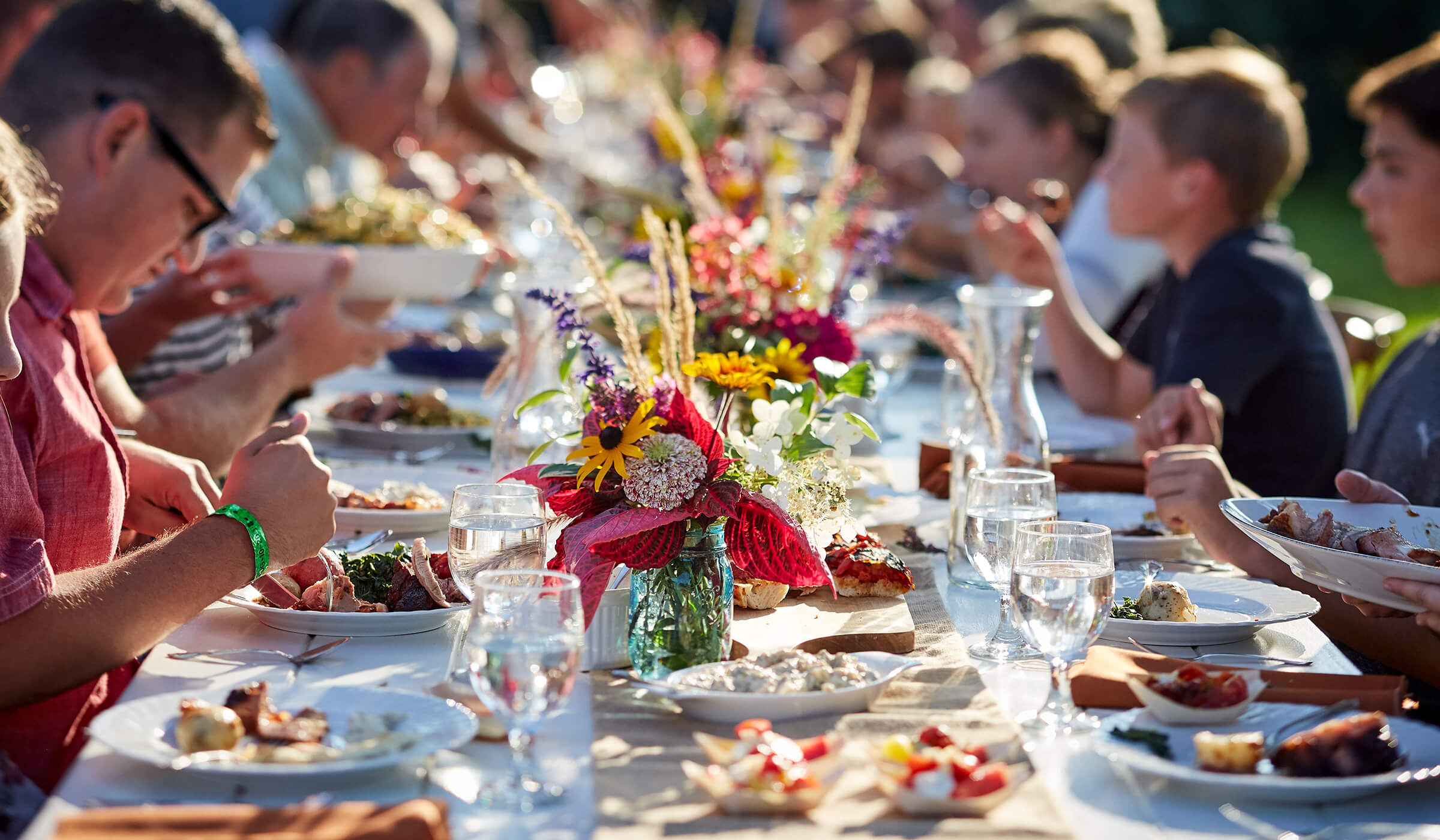We value hard work and humility above all else.
Dwight Mogler
Like all great chefs, the two that have come to visit and help prepare the meal this day have a deep appreciation for farmers in their blood. For author and former Food Network star Amy Thielen, cooking for farmers was simply a matter of paying it back.

“The roots of fine dining come from a rural place,” says Thielen. “It’s where my grandmother’s traditions started, and it’s how I like to cook.” A Minnesota native, Thielen spent ten years working her craft in Manhattan’s trendiest restaurants before returning to Park Rapids, not far from where her great-uncle had founded a family meat market, now run by three cousins, that is still thriving today.
Master Chef Ron DeSantis’s celebrated career has taken him to places like Yale to the Culinary Institute of America, but he is most at home on the farm. “Growing up the son of a town grocer, I lived in the back of the store where my grandfather made fresh sausage daily. My uncles’ families lived on either side of us and we all had gardens. My friends would brag about TV dinners, which were all the rage at the time, but we ate what we grew because that’s what we could afford.”
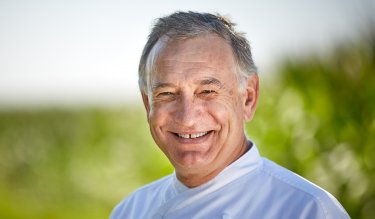
This emphasis on thrift was a recurring refrain, and something more than a coincidence in the stories of the Moglers, the chefs, and Hormel Foods. “Eating well isn’t about money,” Thielen says. “It’s about effort and love.”
A New Generation
While Chef Ron pitched in helping the Moglers smoke fresh Boston pork butt, Chef Amy set out with Janae Mogler to tour the farm. The Mogler land is set among rolling hills under a radiant blue sky. Seemingly endless waves of head-high corn stretch out in every direction. As if the visuals weren’t pastoral enough, the ears are serenaded by the trill of calliope cicadas and songbirds, with grunting mama pigs providing the bass notes.
Janae represents a testament to both the family’s enduring principles and their openness to innovation and change. Along with her twenty-something cousins Ross and Chet, she is part of the Mogler 4th wave that is starting to assume stewardship of the farm. Today, Janae oversees operation of the sow barn and its twenty employees. “Women have traditionally played a supporting role to men in farm families. The farmer’s wife, and all that. I have a lot of respect for that, but it wasn’t a fit for me.”
It is evident from Janae’s tour commentary, and nearly every conversation with a Mogler today, that the new sow barn was a big, big deal. The capital investment alone — in the many millions — illustrates the sorts of massive investments that farmers are making to ensure the future of their families and their livelihoods. “Warren Buffett is a Nebraskan, and agriculture is not part of his portfolio,” Dwight points out with a chuckle. “But the rewards of what we do don’t all show up on a balance sheet.”
First among those rewards, say the Moglers, is family legacy. The Moglers are exceptional in that regard. Cory Bollum, Hormel Foods director of procurement, says this is a big reason the company places special value on the relationship. “Multi-generation farms are becoming fewer and far between, but it’s good business to support them. We get continuity of high-quality supply and they have confidence to make the investments they need to stay competitive.”
Dwight Mogler says the generational torch-passing wasn’t a foregone conclusion. “Farm families don’t have a good history of sticking together past three generations,” he says. “We had a heart to heart with the kids. They had to want it, and they did.”
Upgrades In Progress
By improving their facilities and treating their natural assets with care — like the sow barn’s loose housing model and open pen gestation, which accommodate for a pig’s social nature and mental health — the legacy is maintained from one generation to the next. “It’s pretty simple,” says Dwight. “The pigs provide for us, so we provide for the pigs.”
The homespun nature of that comment, and so many like it over the course of the day, belied another discovery. Namely, that farmers like the Mogler young guns are brainy to the point of nerdiness, despite what their boots and belt buckles and aw-shucks mannerisms might lead you to assume.
Listening to Ross Mogler talk about livestock brings to mind Billy Beane’s “Moneyball” approach to sports analytics. Terms like “precision agriculture” and “fetal programming” infuse the mud and muck with an aura of futuristic possibility. Janae puts it in terms a city boy reporter can understand. “The mother’s diet while pregnant affects the growth of her babies. By regulating the delivery of nutrients to each pig, we ensure the best outcomes for every litter.”
What’s most surprising about this data-driven farm talk is how retro its goals are. Healthy pigs don’t need antibiotics. Precision planting means optimum yields through natural methods. Bollum says consumers “have a fantasy about 1940s farming as some kind of panacea. But the reality is that current practices are so much better. Farm kids today are educated and forward thinking. The efficiencies they’re able to achieve through humane and sustainable advances are mind-blowing.”
Dinner Bell
As dinnertime approaches, more Moglers begin to arrive and come in from the fields. Among the siblings and cousins, a good-natured debate breaks out about which 5th generation Mogler is the most gung-ho future farmer. Ross’s son Khye gets a few votes for his obsessive love of tractors, but it is Chet’s daughter Lily who carries the day. For proof, an iPhone video is passed around of the five-year-old casually escorting a 600-pound mama pig through a sow barn corridor like it was Mary’s little lamb.
Chefs Ron and Amy tag-team the final meal preparations. Long tables are placed end-to-end in the yard with chairs for over four dozen. The dishes that start to populate the al fresco table look beyond good, in the way food magazines at the supermarket check-out tease at some far-off foodtopia. The mic-drop moment, however, is the arrival of the pork roasts, crispy-skinned and steaming from the smoker.
For Chef Amy, it evokes a “taste memory” — a term she coined in her memoir Give A Girl A Knife for a dish that takes you back and grounds you in family and tradition. “My mother’s pork roast was so famous in our family that we just called it ‘The Meal.’ Honeycombed fat on the outside, angel-food tender on the inside.”
Chef Ron found added meaning in the fact that these succulent, smoked-to-perfection roasts were from the same pigs that the Moglers supply to Hormel Foods. “For chefs the same as farmers, our number one responsibility is safety. Is this food healthy to eat? When you see farmers feeding their families the same food they take to market, that says it all.” As a final tribute, he adds, “I tell farmers, my job is just to not mess up what you do. I just cook. Without you, I’m nothing.”
Later, as servers clear the table and the little Moglers escape the grownups for the zip line, the normally nose-to-grindstone farmers find a rare moment for reflection. “My dream is to post a virtual reality tour of our farm online, so folks can get to know us and see how we live,” Janae says, looking at her family and her land. “We want people to know that their concerns are our concerns. You know, to let them know we care.”
